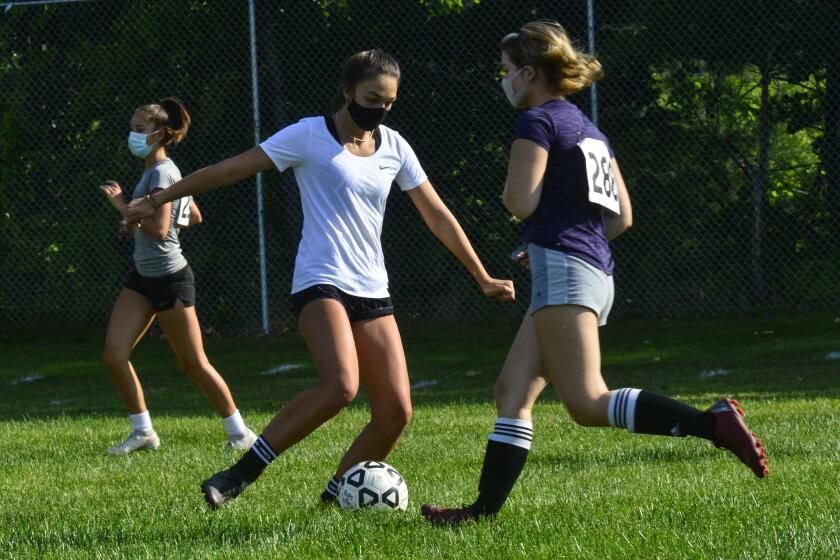Op-Ed: Angry parents are ruining youth sports. Here’s how to rein them in

As millions of kids in the U.S. return to fields and courts for spring sports, black eyes and bloody noses are returning, too. This time the injuries aren’t just among the athletes. These are dangerous times for referees and umpires who call penalties and outs.
In Laurel, Miss., earlier this month, an umpire of a 12-year-olds’ softball game was ambushed by a parent in the parking lot and hit in the face after the game. The accused assailant — wearing a “Mother of the Year” T-shirt — was arrested and charged with simple assault, a misdemeanor, and fined $422.25.
In Livonia, Ga., at a church basketball game this month, a referee was attacked after the final whistle by parents and eighth-grade players. Some 30 stitches later, the ref is recovering.
Attacks have happened at a Texas baseball game, a Northern California soccer game and a Colorado hockey game, where one parent sprayed a referee in the face with an industrial-sized can of Lysol. Chemical warfare comes to youth sports. What next?
No wonder youth sports today face double trouble. Some 70% of young athletes drop out by age 11, primarily because sports aren’t fun anymore. And 80% of referees quit within two years.
Some have called referee abuse “a national crisis.” More broadly, others have labeled youth sports “a cauldron of yelling and hysteria.”
Supporting the psychological well-being of young athletes feels especially urgent now as we emerge from the COVID-19 pandemic.
Although plenty of games go off without a hitch, too many referees are demeaned and rules disregarded, abuse and violence are rampant, and winning appears to be the only thing that matters.
The sideline mayhem has become pervasive enough that nearly two dozen states have laws against harming sports officials. And the Legislature in Minnesota is considering a $1,000 fine for unruly sports parents.
But laws, says Brian Barlow, a referee activist in Oklahoma, aren’t the answer. He has refereed youth soccer for 14 years and started the Facebook page Offside. It began as satire — publicly shaming abusive sideline behavior with video — but has grown into an advocacy group for refs.
The problem is worse than ever, says Barlow, who also runs a referee academy. Leagues are losing referees at record rates, and they’re recruiting at historically low rates. “I’ve never seen a time when so many games are being canceled,” he says.
The result? Kids simply don’t get to play — because their parents can’t behave.
Out-of-control youth sports parents are nothing new. In a 2017 survey by the National Assn. of Sports Officials, some 87% of participants said they had suffered verbal abuse, 13% had been assaulted and 47% had felt unsafe because of administrator, player, coach or spectator behavior. And when it’s all caught on cellphone video, it’s increasingly hard to brush aside these incidents as isolated events.
There’s some reason to believe that this most recent wave of violent behavior — also seen on planes, at grocery stores, at the Oscars — has been fueled by the pandemic. Keith Humphreys, a psychiatry professor at Stanford University, told the Atlantic that the pandemic has created “high-stress, low-reward” situations that can result in shocking outbursts. Other theories? Rudeness is contagious, substance abuse is up and the isolation of the pandemic has been crushing.
Some experts believe that as the world returns to “normal” our societal norms will return too. Eventually. But in the meantime, youth sports parents have to do better.
One solution? When parents are abusive, take away their privilege of watching their kids play youth sports. Barlow believes that banishment would be more effective than a fine.
To make this work, everyone — from the major leagues down through state associations and local clubs and government — needs to adopt a standard of zero tolerance. And then they have to enforce the rules and laws. (The assailant from the softball game in Mississippi will reportedly be banned from all recreational facilities in her city.)
Parents won’t let kids play if the game remains this dangerous. We know how to make it safer.
Referees themselves can also take a stand. At the end of the day, if there’s no ref, there’s no game. It’s hard to accept that it has come to this: Friday night flag football, Saturday morning soccer, canceled because no referee is willing to put up with the abuse.
As I watch parents go nuts on the sidelines — and sometimes feel a little rage myself as a parent coach — I can’t help thinking we’ve gotten everything entirely backward. With time, no one really remembers the score of a youth game. But everyone remembers the parent who went berserk or the ref who was socked in the face.
While you can’t blame anyone for quitting, the answer isn’t to leave the field. It’s to step up and remake youth sports into a communal and civil activity.
Ben Sherwood, founder and CEO of MOJO, a youth sports app, is a soccer referee and has coached his sons for the last 13 years in four sports. He has served as president of ABC News, president of the Disney ABC Television Group and co-chair of the Disney Media Networks.
More to Read
A cure for the common opinion
Get thought-provoking perspectives with our weekly newsletter.
You may occasionally receive promotional content from the Los Angeles Times.












